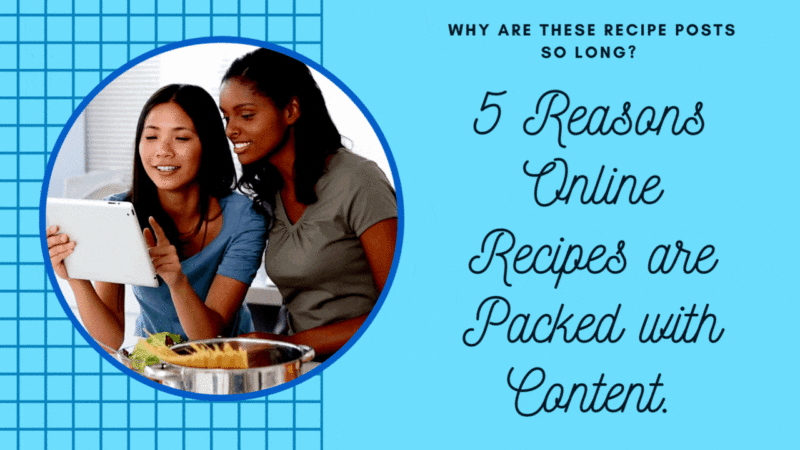We are blessed with the ability to find any kind of recipe we want thanks to all the different food blogs out there. No more looking through cookbooks or magazines to find a recipe that might be good for supper. Now, we can easily search for an online recipe based around one ingredient or a craving that we have. But, with that convivence, comes the long form recipe post, where the person tells you their life story. I’ve been asked by all my friends and family why they do this, and there are a few main reasons I give.

1. They Are Optimizing Their Online Recipes For The Search Engines
Food bloggers (just like all bloggers) need their content to rank high in the search engines like Google if they want people to naturally find their blogs and recipes. One way to do that is by having more words on the page. They will usually include multiple mentions of the recipe, and use different keywords and long tail phrases throughout their content to boost SEO.
In other words, food bloggers want their posts to rank high in the search engines because there are a lot of other food bloggers out there creating similar recipes, and it’s a competition to see who can rank highest and, therefore, get the most visits from people like you and me.
Ironically, I have found some online recipe posts with not much information on them besides the recipe ranking very high in search engines like Google. I don’t understand why. The rule of thumb as a blogger has always been that optimized, well-written content will rank higher than crappy content. But it’s obvious that’s not always the case, and it’s frustrating beyond belief.
2. They Want To Keep People On The Recipe Post Longer
Next, so much information is added to the post because it keeps people on the site longer.
Engagement is important to bloggers because it means that people are more likely to interact with other content on their site and even opt-in to their newsletter.
Also, the longer a person stays on a page, the more likely they are to click on ads or affiliate links and potentially make money for the blogger. And this is important. After all that work, you want to get paid for it, and ads are often one of the top ways for bloggers to make money.
3. They Want to Share Their Personal Connection
Another reason food bloggers add personal information to their posts is that they actually want to share their passion and connection with the recipe. Many recipes are based on family traditions or memories, and it’s important for the blogger to convey that emotional aspect of the dish.
Food blogs are actually some of the most social and personal blogs I’ve seen. There’s a genuine interest in connecting with other people who have similar taste in foods. This personalization can attract readers who share similar values and interests, creating a strong community around the blog.
Personal information also helps readers connect with the blogger on a more personal level, making them more likely to trust and try out their recipes.
And, when relationships are formed between blogger and reader, the reader is more likely to come back often to the blogger’s site, which benefits the blogger in many ways, including:
- More traffic to their site.
- Higher engagement and interaction with their content.
- Higher potential for collaborations with brands or other bloggers.
- More money being made.
4. They Want to Stand Out From the Crowd With A Unique Brand
With thousands of food bloggers out there, it’s essential to stand out from the rest. Adding unique and personal information can make a recipe post more memorable and distinct from other similar recipes.
It also helps build a brand for the blogger, making them easily recognizable and known for their specific style of writing and content. Sam Turnbull come to mind here. She does recipe videos along with her recipe posts, and you can hear Sam in her writing. She has a unique, bubbly brand.
The right type of branding can lead to more opportunities, such as cookbook deals, TV appearances, or even creating their own product line.
With carefully crafted branding strategies in place, many food bloggers have turned their blogs into full-fledged businesses. By adding personal stories and information to their posts, they are able to create a relatable and authentic brand image.
In today’s competitive digital landscape, branding is crucial for success, and food bloggers understand the importance of incorporating personal elements into their content.
5. It Adds Value to Their Readers
Lastly, food bloggers write personal and informative content to add value to their readers.
They understand that many people in their audience are not just looking for a simple recipe; they want an experience and a connection with the person behind the blog. Or they want tips and tricks to make sure the recipe turns out for them.
Sharing personal stories, tips, and tricks can make the recipe post more engaging and relatable, making it easier for reader to connect with the blogger on a deeper level.
My Advice? Just Enjoy The Fact That You Have An Abundance Of Free Online Recipes
I think a lot of people get annoyed by all the extra content because they just want to get to the recipe, but let’s be honest… we are lucky to have free access to these online recipes at any time we want.
It doesn’t have to be that way. If everyone stopped posting recipes, we would have to go back to buying cookbooks and magazines and not being able to create the amazing things we can create today on a whim based on our personal needs or preferences.
In my opinion, we should be rewarding the people who bring us these free recipes by not only using their recipes and commenting on them after we try them, but also taking time to appreciate the amount of work that goes into creating the recipes, taking pictures, writing the content, and putting the entire blog post together.
We should also be clicking out on the ads or contributing to the blog in other ways, such as following them on social media or signing up to their newsletter.
We get free online recipes, so we should help them thrive to create more free recipes for us. It’s a win-win.
And if their online recipes are ranking in Google – which they probably are if you find their online recipe – then they are doing something right, and that’s something to be admired and rewarded. Many people have tried and failed.


